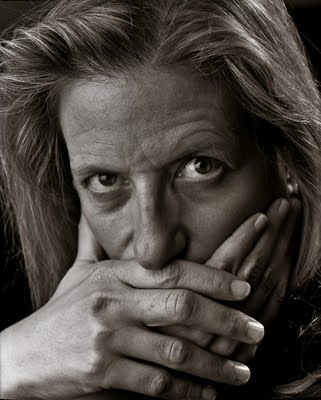 |
| Annie Leibovitz by A W-H |
In a separate suit, Art Capital sued Getty Images, claiming the photo agency had negotiated an improper contract with Ms. Leibovitz, which made it difficult for Art Capital to continue its efforts to sell the Leibovitz archive for $50 million. The New York Times, September 11, 2009
Reading about Ms Leibovitz’s financial travails these days has hit home with me. While I am not in default of a 24 million dollar loan my finances aren’t so hot either. In all that I have read about her problems I have not heard or read one word in defense of her talent.
Some years ago when I photographed and interviewed French photographer Elliott Erwitt I asked him about two photographers. Of Karsh he was caustic, “I think that man not only removes all character from his subjects but he then makes them look oily.” He was a bit kinder about Leibovitz when he said, “She is a good commercial photographer.” And then he repeated, “She is a good commercial photographer.”
It was not too long ago that I participated in a group show at the Exposure Gallery that featured photographs taken with either toy or very primitive box cameras. A recent Emily Carr College graduate (a female) with whom some of my pictures were sharing the wall, told me, “I admire you Alex. I could never be a commercial photographer. I could not photograph sewing machines.” I masked my anger and indignity and only the fact that the she was a woman prevented me from punching her in the nose.
There is a concept out there, particularly in Vancouver, that to be an artist there can be only two routes. There is the one of success and there is the one of failure. But either way one must never compromise one’s idea of what it is to be an artist. If anything, to be starving, confirms that one is an artist. One must never sell out.
Few of these successful artists or the starving ones ever stop to think that while there might not be anybody in Vancouver with the stature of an Edward Steichen, he should be seen as example of a photographer who was an artist (in May, 2006 one of his photographs sold for 2.9 million dollars at Sotheby’s ) and yet managed to shoot for magazines (Vogue) and be the director of photography for the US Navy in the Pacific Theatre during World War II.
I consider myself to be an artist (That is certainly most subjective and probably silly, too.) but when I talk to curators of local galleries, most don’t give me the time of day. I can almost hear them thinking, “This commercial hack. How dare he."
When stare at my many full-sized four-drawer filing cabinets stuffed with negatives, prints and transparencies that I have shot in Vancouver since 1975 I wonder what is to become of them. I know that there is a treasure there that encompasses many cultural and political events of our city and region. I keep filing stuff in preparation for making it easy for someone to dispose of them when I die.
During an opening of mine at a gallery a well known local collector told me how much he admired me. I told him that the best way to admire me was to buy some of my work. I then told him of the archive buzzards who haunt the gallery openings of old artists or old commercial photographers like me. I have seen them in action at memorials to dead photographers. They go to the widow and say, sensitively, “How would you like to pay homage to the memory of your husband? Why don’t you donate his archive to us?" The art collector had not heard because when I finished he said, “I would like you to contact this man who is in charge of the archives at Simon Fraser.”
Going back to Annie Leibovitz I must assert that I think that she is a very good photographer. I know because I am a good photographer. But I work alone. In fact I work alone because I cannot afford to pay anybody to help me. If Annie Leibovitz can and has an infinity of helpers that was and is her call and that did and should not diminish the quality of what she does.
Many photographers to whom I have talked to about Leibovitz in Vancouver, more often than not say, “ She is not really a good photographer. I could be as good as she is if I had her access." These photographers forget that because she was good, she obtained that access that, in this day and age, can be the difference between the good portrait and Facebook junk. Few have seen the young upstart sharing dark corners backstage with roadies in Robert Frank’s unreleased 1972 documentary of the Rolling Stones, Cocksucker Blues. Leiboviz has paid her dues in full.
Perhaps some of the lack of sympathy for the woman may have to do with her relationship with Susan Sontag. That anybody could have lured home a woman of such intellectual capacity and genius as Sontag must have many more talents besides that of being a good photographer.
Erwitt might assert in his deprecatory manner that Leibovitz is commercial. As far as I can see, that Leibovitz is good, is good enough for me.
The suit by Art Capital relating to the activities of Getty Images is what really is the news. Getty Images is appropriating and buying most of the images, (be they photographs or paintings) that represent a legacy of our world's culture. If they are allowed to become the monopoly they may one day be, we will have to pay some day to look (on the web) at an image of Leonardo's La Gioconda.